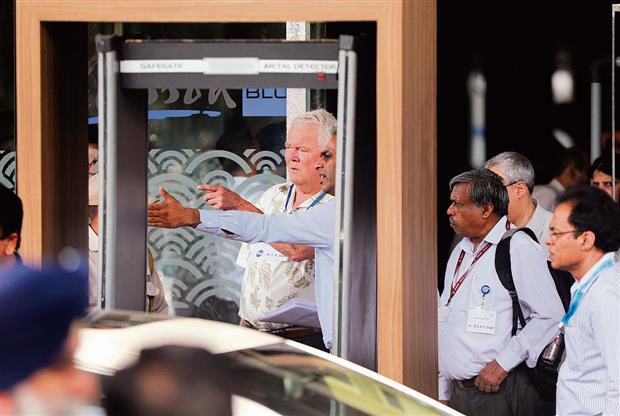Indus Water Treaty: Pakistani delegation inspects power projects in Kishtwar
Jammu, June 24
A delegation comprising neutral experts from different countries began their analysis of different power projects in Kishtwar under the Indus Water Treaty (IWT) on Monday. The delegation comprising at least 40 experts from USA, UK, Canada, Australia and Russia, among other countries, reached Kishtwar along with the Indian team. The delegation also includes at least five members from Pakistan, who will inspect various under-construction power projects in the region.
This is the first visit by a Pakistan delegation to Jammu and Kashmir in more than five years under the dispute settlement mechanism of the 1960 treaty. India and Pakistan signed the IWT after nine years of negotiations, with the World Bank being a signatory of the pact, which sets out a mechanism for cooperation and information exchange between the two sides on the use of waters of a number of cross-border rivers.
In 2019, a Pakistan delegation comprising of three members had inspected two power projects in the region. Of late, the relations between India and Pakistan soured following the Pulwama attack by terrorists in which 40 CRPF personnel were killed in Kashmir. The relations further nosedived after the Central Government abrogated the special status of J&K in August 2019.
Immediately after landing at an Army camp, the delegation visited the National Hydroelectric Power Corporation (NHPC) headquarters, an official said, adding that they left for the 85 MW Ratle hydroelectric power project site at Drabshalla for dam inspection. They will also visit the 1,000 MW Pakal Dul hydroelectric project on Marusudar, a tributary of the Chenab, and other power projects during their stay in Kishtwar.
Pakistan had in a request to the World Bank in 2016 objected to the design features of the two hydroelectric power projects and sought a settlement through a ‘neutral expert.’ The country, however, later withdrew the request and sought adjudication through a Court of Arbitration. India, on the other hand, insisted that the issue should be resolved solely through ‘neutral expert’ proceedings.
After failed negotiations, the World Bank appointed a neutral expert and the chair of the Court of Arbitration in October 2022. Issuing a notice for the modification in the treaty, India warned that “such parallel consideration of the same issues is not covered under any provision of the IWT”.
In July 2023, the Court of Arbitration ruled that it was “competent to consider and determine the disputes set forth by Pakistan’s request for arbitration.” Pakistan filed its first memorial, which listed out its legal case with documents, under this process in March this year. A month later, the court undertook a week-long visit to the Neelum-Jhelum Hydro-Electric Plant in Pakistan-occupied Kashmir “to familiarise the court with general aspects of the design and operation of run-of-river hydro-electric plants along the Indus system of rivers”.
While India refused to take part in the Court of Arbitration, it submitted a memorial to the neutral expert in August 2023.
Pakistan joined the second meeting of the parties held by neutral expert in Vienna in September last, which discussed matters related to the organisation of the site visit. The J&K administration has appointed 25 “liaison officers” to coordinate the visit of neutral experts along with delegations from India and Pakistan. The 40-member delegation also comprises technical experts from the USA and Canada. — With PTI inputs
First visit in 5 years
- This is the first visit by a Pakistan delegation to Jammu and Kashmir in more than five years under the dispute settlement mechanism of the Indus Water Treaty
- Relations between India and Pakistan soured after the Pulwama attack by terrorists, in which 40 CRPF personnel were killed
- The relations further nosedived after the Central Government abrogated the special status of J&K on August 5, 2019
- India and Pakistan had signed the treaty after nine years of negotiations in 1960









